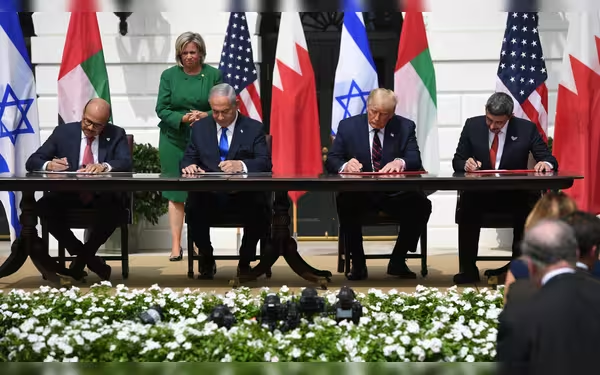Saturday, November 16, 2024 03:16 PM
Impact of Gaza War on Arab-Israeli Normalization Efforts
- Gaza war challenges Abraham Accords' future.
- UAE and Bahrain maintain ties with Israel.
- Saudi Arabia's stance remains unchanged since 2002.
 Image Credits: arabnewspk
Image Credits: arabnewspkThe Gaza war poses challenges to the Abraham Accords, yet UAE and Bahrain maintain ties with Israel amid shifting geopolitical dynamics.
Four years ago, a significant moment unfolded on the South Lawn of the White House. Donald Trump, flanked by Israeli Prime Minister Benjamin Netanyahu and the foreign ministers of Bahrain and the UAE, celebrated the signing of the Abraham Accords. This agreement marked a pivotal shift in the Arab-Israeli peace process, as Bahrain and the UAE became the first Arab nations to recognize Israel since Egypt in 1979 and Jordan in 1994. The accords aimed to foster peace in the Middle East, emphasizing mutual understanding and coexistence.
Since the signing on September 15, 2020, the accords have led to numerous developments. For the first time, direct calls could be made from the UAE to Israel, and trade agreements flourished. However, the absence of Saudi Arabia, a major player in the region, raised questions about the future of these agreements. Speculation about Saudi Arabia normalizing relations with Israel intensified, especially after Crown Prince Mohammed bin Salman hinted at potential cooperation in a recent interview.
However, the landscape shifted dramatically on October 7, 2023, when Hamas and its allies launched an attack on Israel. This event cast a shadow over the Abraham Accords, leading many to believe that the initiative might falter like previous peace efforts. Yet, some experts argue that it is premature to dismiss the accords entirely. They suggest that the future of these agreements may hinge on the outcome of the upcoming U.S. presidential election.
Sanam Vakil, a director at Chatham House, noted that the accords are "weathering this very difficult storm of the Gaza war." Despite the turmoil, the UAE and Bahrain have not shown any inclination to sever ties with Israel. In fact, they believe that maintaining diplomatic relations provides them with a better platform to support the Palestinian cause.
On the Israeli side, normalization with Saudi Arabia seems unlikely at this moment. The Israeli leadership is currently focused on other priorities, and the recent conflict has increased the stakes for any potential agreement. There is a belief that waiting might lower the price of normalization in the future, especially if the political landscape changes in the U.S.
Brian Katulis from the Middle East Institute expressed uncertainty about whether a Trump or Kamala Harris administration would be more effective in revitalizing the Abraham Accords. He pointed out that foreign policy issues, including the accords, are not at the forefront of American political discourse, which is currently dominated by domestic concerns.
While Trump, as the architect of the accords, might seem eager to re-engage with this initiative, his unpredictable leadership style raises questions about his focus. Conversely, Kamala Harris has shown a willingness to discuss a two-state solution, which resonates with many in the Arab world.
Ultimately, Saudi Arabia's position is unlikely to shift significantly from its stance in 2002, when it proposed the Arab Peace Initiative. This initiative offered Israel peace and normalization with all Arab states in exchange for a full withdrawal from occupied territories.
The future of the Abraham Accords remains uncertain, especially in light of recent events. While challenges abound, the commitment of Bahrain and the UAE to maintain their ties with Israel suggests that there may still be hope for progress. The outcome of the U.S. presidential election could play a crucial role in shaping the next steps in this complex geopolitical landscape. As the world watches, the dynamics of the Middle East continue to evolve, reminding us that peace is often a long and winding road.













